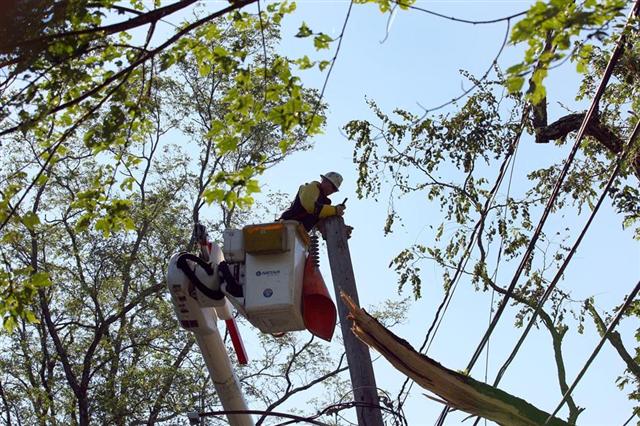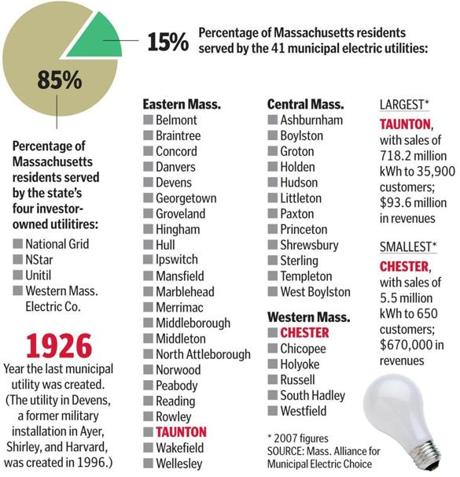HOME / BUSINESS
A municipal buzz
Legislation to ease formation of local utilities gets boost from storm
By Erin Ailworth
Globe Staff / September 10, 2011
Customer complaints about the response of utility companies to Tropical Storm Irene has revived interest in legislation that would make it easier for Massachusetts cities and towns to create their own municipal electric utilities.
Proponents say Irene, which left thousands of households without power for nearly a week, could be the catalyst that finally moves the legislation, which has languished on Beacon Hill for about a decade. The storm knocked out power to roughly 800,000 customers served by the state’s four investor-owned utilities, National Grid, NStar, Western Massachusetts Electric Co., and Unitil Corp.

NStar crew Doug Hernon up in the trees doing repairs after Hurricane Irene on Chestnut Street. DAVID L. RYAN/GLOBE STAFF
In addition to spending days in the dark, many customers said they struggled to get information from power companies about when power would be restored. Already, customers in Lexington, Attleboro, Fitchburg, and Quincy have contacted the bill’s sponsors asking about forming local utilities after municipal lighting departments in communities such as Wellesley and Concord quickly restored power.
“Irene just underscores the critical nature of how important it is for us to pass this bill,’’ said state Representative Stephen L. DiNatale, Democrat of Fitchburg, who cosponsored the bill with state Representative Jay R. Kaufman, a Lexington Democrat.
The state has 41 municipal utilities, but no new one since the 1920s. The biggest obstacle has been the need for cities and towns to purchase power lines and other assets from investor-owned utilities. But those companies have no incentive to sell under Massachusetts law, since they would lose valuable infrastructure and customers.

The bill pending in the Legislature would give the state Department of Public Utilities more authority to establish a fair sale price and require investor-owned utilities to agree to a sale.
Supporters of municipal utilities say smaller power agencies could benefit some communities by potentially lowering electricity bills and giving local officials more control - especially in emergencies.
Patrick Mehr, a Lexington resident and spokesman for the Massachusetts Alliance for Municipal Electric Choice, which supports the creation of municipal utilities, said big utilities often don’t respond well, particularly when power is being restored after a big storm. Having a community-run utility, he said, could fix that problem because local officials would be responsible to their constituents.
Harvey Reiter, a lawyer who has worked with municipal power agencies, said a mix of public and private utilities creates competition that can help customers.
“There’s nothing inherently more or less efficient based on whether they’re government owned or private owned,’’ said Reiter, a partner at Stinson Morrison Hecker LLP’s Washington office. “What seems to drive their performance is the threat that they could be replaced.’’
NStar, National Grid, and Unitil, which have opposed efforts to make it easier to form municipal electric companies, question whether a community agency could better serve customers. “With respect to service, having access to resources from other parts of a large utility is a tremendous advantage,’’ said National Grid spokeswoman Jackie Barry, citing how the utility aided several municipal utilities hit by an ice storm in 2008. “With respect to costs, our ability to procure power at wholesale prices for millions of customers, our ability to spread capital and operations and maintenance costs over one million customers works to keep prices down.’’
Utilities have also lobbied against such proposals because of concerns about how the state Department of Public Utilities would set prices on assets they’d be forced to relinquish.
“Our main concern would be getting fair market value,’’ said Caroline Allen, spokeswoman for NStar, which this year has spent more than $70,000 opposing the municipal utility bill and other legislation. Similarly, National Grid spent $25,000.
It’s unclear whether new municipal utilities would benefit Massachusetts ratepayers. The rates charged by municipal utilities historically have been lower than those of investor-owned power companies, saving customers anywhere from $1 to $30, a month. But a 2010 study by the state Department of Energy Resources found that the cost of creating and running a municipal lighting agency today wouldn’t guarantee savings for customers.
In addition, investor-owned utilities are large taxpayers, and communities could lose millions in revenue if they were replaced by public entities. Utilities also are required by the state to provide special rates for low-income ratepayers, meet energy efficiency and renewable energy mandates, and regularly report on their performance. Municipal utilities are not bound by all those rules.
“What we stress is that going with the municipalization process is an extremely complex process,’’ said Alec O’Meara, a spokesman for Unitil, which has 28,000 customers in Massachusetts. “It’s a case-by-case situation. Each town is different, each community has different needs.’’
Erin Ailworth can be reached at eailworth@globe.com. Follow her on Twitter @ailworth.
----------------------------------------------------------------------
HOME / BUSINESS
LETTERS
More benefits of municipal utilities
September 18, 2011
“A Municipal Buzz’’ (Sept. 10) described well the benefits of municipal utilities, especially in regard to the poor response of the for-profit utilities to Hurricane Irene. Unfortunately, the story touched briefly on three points in ways that may have confused some readers.
While the for-profit utilities pay property taxes, the muni utilities make payments in lieu of taxes, discount rates for municipal buildings, share equipment with the DPW, and otherwise financially benefit their towns, often much more than the property tax rate. Voters control the muni utility and its municipal contributions.
The private utilities discount their rates to low-income customers, but the muni utilities charge all households even lower rates.
Finally, the bills that would facilitate new munis require that they provide services (including efficiency and renewables) comparable to those of the for-profit utilities. The Legislature can add any further necessary standards.
In short, forming new municipal utilities will benefit consumers, the municipality, and public policy. The possibility of losing parts of their territories may even motivate the profit-driven utilities to improve their service.
Paul Chernick
Founder, Mass Alliance for Municipal Electric Choice
----------------------------------------------------------------------
Comment posted on 9/10/2011 1:03 PM EDT by patrickmehr on http://www.boston.com/business/articles/2011/09/10/response_to_irenes_outages_revives_interest_in_municipal_utilities/
Here are corrections to 4 factual errors or false implications in the next-to-last paragraph of the story, ending with "Municipal utilities are not bound by all those rules." NStar and National Grid have propagated such misinformation in the past, and could be the source this Globe reporter used without checking the facts.
(1) "In addition, investor-owned utilities are large taxpayers, and communities could lose millions in revenue if they were replaced by public entities."
The part before the comma is correct. The part after the comma is wrong, as DOER noted in its January 2010 report on municipal utilities (http://www.mass.gov/Eoeea/docs/doer/publications/doer-municipal-utility-rpt.pdf): “Municipal utilities are exempt from state and federal income and municipal property taxes. Most municipal utilities do provide payments in lieu of taxes (“PILOTs”) to the town or towns they serve. Though the amounts of the PILOTs vary by municipal utility, taken as a whole the PILOTs are similar to what IOUs paid in municipal taxes in 2008.” (page 5). More details at #5 of http://www.massmunichoice.org/Documents/Annotated summary of DOER muni report.pdf
(2) "[Investor-owned u]tilities also are required by the state to provide special rates for low-income ratepayers, […]"
True, but since, as the DOER report found (#4 in http://www.massmunichoice.org/Documents/Annotated summary of DOER muni report.pdf), most municipal utilities charge less to everyone than IOUs charge under their "low-income" rates, low-income customers today fare better with a municipal utility than with an IOU.
(3) "[IOUs also are required by the state to] meet energy efficiency and renewable energy mandates, […]"
New municipal utilities (as opposed to existing ones) will, per Muni Choice bill H869, fully comply with the Green Communities Act, just like IOUs. The story, correct for existing municipal utilities, incorrectly implies the opposite for future municipal utilities.
(4) "[…] and regularly report on their performance."
Post-Irene, after the 2008 ice storm in central Massachusetts, or when blue-sky outages occur, we see that reporting by IOUs does not ensure good service. More effective, as recent press reports illustrate (http://articles.boston.com/2011-09-04/news/30113323_1_outages-electric-grid-repair-crews), is that a municipal utility is right in the community it serves, promoting responsiveness and accountability.
